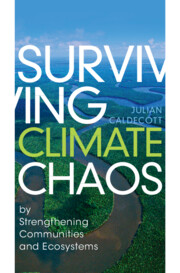Book contents
- Surviving Climate Chaos
- Surviving Climate Chaos
- Copyright page
- Dedication
- Contents
- Preface
- Acknowledgements
- Part I Context, Tools and Systems
- Part II Understanding Climate Chaos
- Part III Practical System Strengthening
- Part IV Global Perspectives
- 9 Changing Ideas of Adaptation
- 10 Learning from the Adaptation Communications
- 11 Adaptation in Specific Geographies
- Part V Conclusions
- Abbreviations and Acronyms
- References
- Index
11 - Adaptation in Specific Geographies
from Part IV - Global Perspectives
Published online by Cambridge University Press: 02 September 2021
- Surviving Climate Chaos
- Surviving Climate Chaos
- Copyright page
- Dedication
- Contents
- Preface
- Acknowledgements
- Part I Context, Tools and Systems
- Part II Understanding Climate Chaos
- Part III Practical System Strengthening
- Part IV Global Perspectives
- 9 Changing Ideas of Adaptation
- 10 Learning from the Adaptation Communications
- 11 Adaptation in Specific Geographies
- Part V Conclusions
- Abbreviations and Acronyms
- References
- Index
Summary
The EU member states have massively documented climate change and their own vulnerabilities to it, as well as their efforts to prepare for its effects under scenarios that are worsening with every iteration of the climate models. Being the EU, member states, sub-national regions and cities are free to share, cooperate and learn, so together they offer a rich source of experiment and knowledge. Representing a quarter of UN members, many small island states are exceptionally vulnerable to climate change and are taking diverse and determined measures to survive, but several are now forced to consider a future in which their territories are entirely uninhabitable. In Africa the climate response is pragmatic and utilitarian, marked by resignation but also a confidence in Africans’ ability to cope and in the value of traditional knowledge-based solutions to climate problems. And the Americas have some strong examples of regional and south–south cooperation and local empowerment, and are sources of new thinking on the rights of Indigenous peoples and peace with nature.
Keywords
- Type
- Chapter
- Information
- Surviving Climate Chaosby Strengthening Communities and Ecosystems, pp. 246 - 276Publisher: Cambridge University PressPrint publication year: 2021

